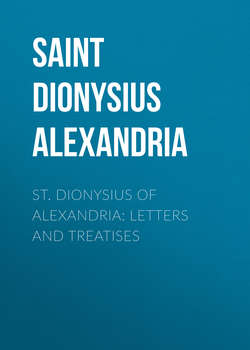Читать книгу St. Dionysius of Alexandria: Letters and Treatises - Saint Dionysius of Alexandria - Страница 9
INTRODUCTION
His Action about Heretical Baptism
Оглавление10. During this interval of peace, but chiefly towards the end of it, Dionysius took part in that controversy about heretical baptism to which the letters on pp. 51 ff. belong. Up till now various parts of Christendom had followed various customs on this matter without much disputing. In Asia Minor and in Africa baptism by heretics was not recognized, while in the West baptism with water in the name of the Trinity or of Christ was held valid by whomsoever performed. Before the middle of the third century, however, the difference of practice gradually became more and more a matter of controversy. In or about A.D. 230 two synods were held one after the other at Iconium and at Synnada (see p. 58, n.), which confirmed the opinion that heretical baptism was invalid: and some twenty-five years later on Cyprian of Carthage convened several synods in North Africa, which arrived at the same conclusion. Thereupon a violent quarrel arose between Cyprian and Stephen the Bishop of Rome; this became, perhaps, all the keener, because of the former alliance and co-operation between Cyprian and Stephen’s predecessor, Cornelius, in combating the Novatianist schism,4 which had eventually led also to heresy over the restoration of those who had lapsed under persecution. Severe language was now used on both sides, and other leading Churchmen of the day were naturally drawn into the discussion: among them our Dionysius, who – after the first, at all events – with characteristic sagacity steered a middle course and advised that the older spirit of toleration should be maintained, the circumstances of different churches requiring different methods. Fragments of five letters on this subject have come down to us, all addressed to the Church of Rome or rather to representative members of that Church, the first of them probably written in 254 when the Novatianist schism was subsiding (see p. 52), and the others belonging to the year 257 (see pp. 54 ff.).
4
For Dionysius’s share in this dispute see his letter on p. 50.
